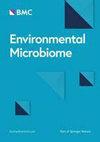单个产甲烷颗粒是整个生态系统的复制品,对环境线索的反应具有可重复性
IF 6.2
2区 环境科学与生态学
Q1 GENETICS & HEREDITY
引用次数: 0
摘要
在这项研究中,单个产甲烷(厌氧)颗粒生物膜被用作真正的群落复制品,以评估整个微生物群落对环境诱因的反应。聚合体来自实验室规模的工程生物废水处理系统,经过大小分离,最大的颗粒在微批次反应器(μBRs)中单独接受受控环境诱因。根据 cDNA 分析,各个颗粒的活性群落结构完全相同。此外,根据 16S rRNA 基因测序的深度观察,单个颗粒的活性微生物群落对 pH 值、温度、基质和痕量金属补充等环境变化的反应具有可重复性。我们确定了与所测试的每种环境条件相关的抗逆性和易感性类群,以及经过挑选的专门类群,它们的生态位偏好涵盖了有机物完全厌氧降解所需的整个营养链。我们发现,单个厌氧颗粒可被视为高度复制的整体生态系统,在微生物生态学领域具有潜在用途。此外,它们还是工程生物反应器元群落中最小的整体群落单元。当受到各种环境诱因的影响时,厌氧颗粒会做出可重复的反应,从而为测试整个群落对各种环境条件的反应的高通量研究提供了难得或独特的机会。本文章由计算机程序翻译,如有差异,请以英文原文为准。
Individual methanogenic granules are whole-ecosystem replicates with reproducible responses to environmental cues
In this study, individual methanogenic (anaerobic), granular biofilms were used as true community replicates to assess whole-microbial-community responses to environmental cues. The aggregates were sourced from a lab-scale, engineered, biological wastewater treatment system, were size-separated, and the largest granules were individually subjected to controlled environmental cues in micro-batch reactors (μBRs). Individual granules were identical with respect to the structure of the active community based on cDNA analysis. Additionally, it was observed that the active microbial community of individual granules, at the depth of 16S rRNA gene sequencing, produced reproducible responses to environmental changes in pH, temperature, substrate, and trace-metal supplementation. We identified resilient and susceptible taxa associated with each environmental condition tested, as well as selected specialists, whose niche preferences span the entire trophic chain required for the complete anaerobic degradation of organic matter. We found that single anaerobic granules can be considered highly-replicated whole-ecosystems with potential usefulness for the field of microbial ecology. Additionally, they act as the smallest whole-community unit within the meta-community of an engineered bioreactor. When subjected to various environmental cues, anaerobic granules responded reproducibly allowing for rare or unique opportunities for high-throughput studies testing whole-community responses to a wide range of environmental conditions.
求助全文
通过发布文献求助,成功后即可免费获取论文全文。
去求助
来源期刊

Environmental Microbiome
Immunology and Microbiology-Microbiology
CiteScore
7.40
自引率
2.50%
发文量
55
审稿时长
13 weeks
期刊介绍:
Microorganisms, omnipresent across Earth's diverse environments, play a crucial role in adapting to external changes, influencing Earth's systems and cycles, and contributing significantly to agricultural practices. Through applied microbiology, they offer solutions to various everyday needs. Environmental Microbiome recognizes the universal presence and significance of microorganisms, inviting submissions that explore the diverse facets of environmental and applied microbiological research.
 求助内容:
求助内容: 应助结果提醒方式:
应助结果提醒方式:


